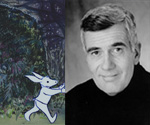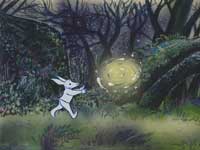

THE BIOGRAPHY OF JOHN CANEMAKER
John Canemaker has won an Academy Award, an Emmy and a Peabody Award for his animation and is an internationally-renowned animation historian and teacher. A key figure in American independent animation, Canemaker’s work has a distinctive personal style emphasizing emotion, personality and dynamic visual expression.
His film, The Moon and the Son: An Imagined Conversation, won an Oscar in 2005 for Best Animated Short, as well as an Emmy. A 28-minute autobiographical essay about a troubled father/son relationship, The Moon and the Son marked a personal and professional breakthrough in animation storytelling.
Canemaker is also a noted author who has written nine books on animation, as well as numerous essays, articles and monographs for The New York Times and The Wall Street Journal, among other publications.

He has taught at several colleges and universities in the course of his career, including a guest residency at Yale, but he is most closely associated with New York University’s Tisch School of the Arts, where he began teaching in 1980 and was one of the founders of the animation program. Canemaker is a full, tenured professor who became the program’s executive director in 1988 and served as Acting Chair of the NYU Undergraduate Film and Television Department in 2001-2002.
John Canemaker was born in Waverly, New York, in 1943 and raised in nearby Elmira where he completed his first animated film while in his teens. After graduating from Notre Dame High School in 1961, he moved to New York City, where he pursued an acting career for the next decade. He appeared off-Broadway, in stock companies and in over 35 national TV commercials. In 1971 he became an undergraduate at Marymount Manhattan College, where he received his Bachelor of Arts in 1974. He later completed a MFA in Film at New York University.
His advisor at Marymount, Sister Dymphna Leonard, encouraged him to return to his childhood interest in animation. She arranged for Canemaker to do research at the Walt Disney Studio Archives in 1973. His interviews there formed the basis for his first published writings on animation, and stimulated him to continue researching animation history. In addition to more than 100 newspaper and magazine articles, he produced the documentaries Remembering Winsor McCay (1976) and Otto Messmer and Felix the Cat (1977).
At the same time, Canemaker began making the first in a series of personal animated shorts. These films, including Greed (1974), The 40's (1974), Street Freaks (1975), Confessions of a Stardreamer (1978), The Wizard's Son (1981), Bottom's Dream (1983), Confessions of a Stand-Up (1993) and Bridgehampton (1998), are part of the permanent collection of the Museum of Modern Art. MoMA has twice hosted retrospectives of Canemaker’s films, in 1984 and in 1998.
His commissioned work for television and feature film includes commercials, Sesame Street, The Electric Company, Pee Wee’s Playhouse, and an animated sequence in The World According to Garp (1981). He created animation for two award-winning documentaries: HBO’s You Don’t have to Die (1989), which won an Academy Award for documentary short; and Break the Silence: Kids Speak Out Against Abuse (1991), a Peabody Award-winning CBS special.
His first book, The Animated Raggedy Ann and Andy, detailing the making of an animated feature based on Johnny Gruelle’s storybook characters, was published in 1977. Eight more books followed: Treasures of Disney Animation Art (1982),Winsor McCay: His Life and Art (1987), Felix: The Twisted Tale of the World’s Most Famous Cat (1991), Tex Avery: The MGM Years (1996), Before the Animation Begins: The Art and Lives of Disney Inspirational Sketch Artists (1996), Paper Dreams: The Art and Artists of Disney Storyboards (1999), Walt Disney’s Nine Old Men and the Art of Animation (2001), The Art and Flair of Mary Blair (2003), and a revised and updated edition of Winsor McCay (2005).
A collection of Canemaker’s animated films, John Canemaker: Marching to a Different Toon, is distributed by Milestone Film and Video. This DVD also includes the documentary Otto Messmer and Felix the Cat. Milestone has also released his documentary, Remembering Winsor McCay, as bonus material on the DVD Winsor McCay: The Master Edition.
Canemaker himself is a featured commentator on many classic animation DVD releases, including the Disney films Snow White and the Seven Dwarfs, The Fantasia Anthology, Dumbo, Peter Pan, and Beauty and the Beast, as well as Cut-Up: The Films of Grant Munro, The Mask, and Winsor McCay: The Master Edition.
He has been interviewed on NBC’s The Today Show, PBS’s News Hour with Jim Lehrer and Entertainment Tonight, and lectures at film and animation festivals around the world.


JohnCanemaker.Com, www.johncanemaker.com © 2000, 2003, 2004, 2005, 2006, 2007. All Rights Reserved. The website is for education and information use only. All contents may not be reproduced or distributed without the express written consent of John Canemaker. Under no circumstances shall John Canemaker and www.johncanemaker.com, its subsidiaries, or its members be liable for any direct, indirect, punitive, incidental, special, or consequential damages that result from the use of, or inability to use, this site. Website by SJB © 2000, 2003, 2004, 2005, 2006,2007. All Rights Reserved.